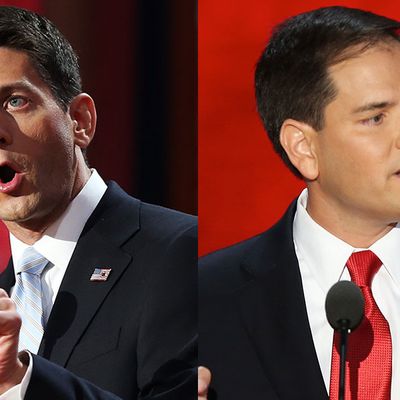
On November 8, two days after the reelection of President Obama and a near sweep of contested Senate seats for the Democratic party, Charles Krauthammer laid out the way forward for his shell-shocked party. In an op-ed column, the writer and talking head bluntly advised his party that it needed one, and only one, ideological adjustment. It needed to adopt immigration reform, including amnesty. Otherwise, the party’s anti-government bromides offered a perfectly suitable ideological platform.
The substantive merits of the advice were questionable. Latinos did not represent the GOP’s only obstacle to winning, and immigration reform did not account entirely even for Latino voting preferences. Nonwhite voters held more liberal positions across the board, and the GOP’s relentless preference for low taxes for the rich over popular social programs played a major role in its political marginalization. Still, the base’s commitment to harsh, inhumane restrictionism is the simplest and — from the standpoint of the party elite, which is generally either indifferent to or supportive of greater immigration — most ideologically painless wound to close. As the party’s response has taken form in recent weeks, it is following Krauthammer’s prescription, almost to the letter.
The key figures leading the way are Paul Ryan, the Republicans’ de facto leader, and Marco Rubio, perhaps its leading presidential candidate. The two have moved generally in tandem, with Rubio leading the way on immigration, but the whole party apparatus has jolted into action. Within days of the election, partisan barometers like Krauthammer and Sean Hannity had announced they had suddenly changed their mind and now favored comprehensive reform. Freed up to cut a deal, Rubio has thrown himself behind a reform plan liberals can happily accept, while he has steadily neutralized every source of conservative discontent. (Hardly a day goes by without some new Republican praising Rubio’s plan.) Crucially, Ryan himself has signaled support for Rubio. The party’s rapid embrace of immigration reform has been a sight to behold, a ruthlessly efficient exercise in partisan calculation.
It is equally clear that the second half of Krauthammer’s prescription — change nothing else — has prevailed. Ryan has led the way here, hammering out the way forward at the House Republican retreat in Williamsburg, and most recently at the National Review Institute gathering last weekend, where he spoke.
The theme and overarching tone of Ryan’s remarks has been “prudence,” and this may sound like moderation, but it’s important to understand what Ryan is really getting at here. When Republicans stormed into control of the House two years ago, they — or many of them — believed they could actually force President Obama to accept their agenda through sheer willpower. Most of the last two years have been a spate of Republicans forcing crises in order to bend Obama.
That is the context in which Ryan is arguing. He is gently trying to talk the ultracrazy faction out of its belief that the crisis method offers a promising path to legislative success. He is not fully renouncing it, only counseling the party to use threats more carefully and with more limited means.
But the “moderate” position in this intra-party debate is not to find some acceptable middle ground on size-of-government issues. Substantive compromise on taxes and spending is off the map of the entire intra-Republican debate. It is to do nothing at all. Ryan argues that Republicans should simply endure the next four years and hope to win the next election cycle when they can implement their ideas:
Unfortunately, the Democrats are unlikely to accept our proposals. They refuse to consider real reform. But we will lay the groundwork for future endeavors. So when reform is possible, we will be ready.
Indeed, if you listened to Ryan on Meet the Press yesterday, his solution to the party’s identification with the rich is simply to assert that Republicans are the party of “growth” and “opportunity.” Not only is he sticking with the same anti-tax policies that have dominated Republican thought for three decades, he is proposing to sell them with the same buzzwords Republicans have been using for three decades.
In his November column, Krauthammer assured the faithful that the party liturgy on taxes and spending was perfectly sound: “Onrushing economic exigencies — crushing debt, unsustainable entitlements — will make the argument for smaller government increasingly unassailable.” I don’t believe this premise is true, though the Republican plan of refusing to accept any deal with higher revenue and lower spending will make it less untrue. In any case, there’s a perfect logic. The Republicans are going to want to run in 2016, and “runaway debt” is the most promising issue they have. If they strike a bipartisan deal to square that away, what issue do they have left?






























